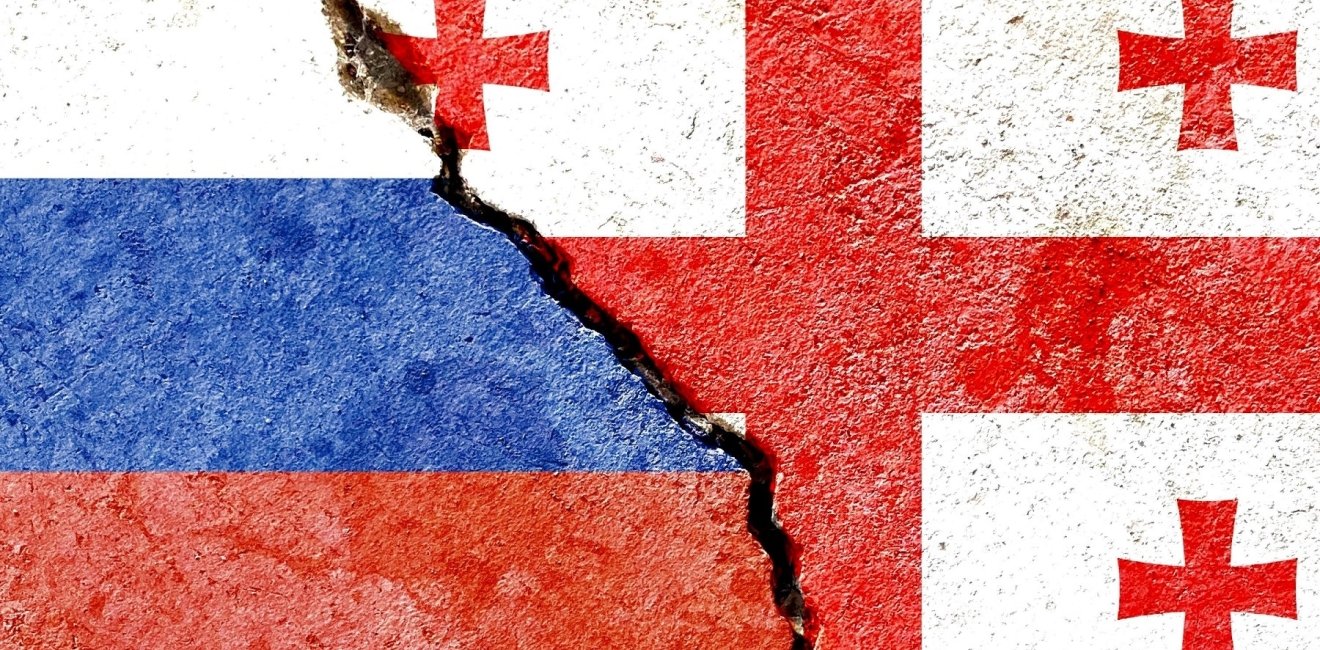
A blog of the Kennan Institute
BY ANDREI BABITSKY
Every time I look out of my window in the morning I see this sign: ახალი ხორცი. It reads “Ahali hortsi,” which means fresh meat, and nowadays is accompanied by a graffito, “Fuck Russia.” The sign is written in the most beautiful alphabet in this world, and one of the very few phonetic alphabets in existence.
A friend of mine keeps telling me that to learn a language, let alone a language this difficult, she has to “perdre la honte,” lose the shame, get used to the fact that people smile at her attempts at pronouncing the word water, that she has to ask interlocutors to repeat almost every phrase twice. It’s a lesson in humility, not only in semantics. And I can’t stop thinking about that. About the humility of a student and the arrogance of the teacher. In this particular case the unlikely teacher is Russian culture, my culture, which I can’t stop blaming at least partly for this catastrophic war.
My family fled to Tbilisi along with some 20,000 people from Russia, if the official numbers tell the whole story. Russian speech can be heard everywhere in Tbilisi, and most of the Russian-speaking people come from Russia. Geography and the Russian navy in the Black Sea guarantee that almost no Ukrainian refugee can quickly get to Georgia. And Russians never speak Georgian.
Before the war they were mostly tourists, they paid their bills, so few Georgians expected their guests to learn the language. But now most Russians are refugees. They left their homes and belongings 2,000 kilometers behind, and even if they have money, they have to rely on the good disposition and friendly attitudes of their hosts.
Still, not a single Georgian word. Not even a simple greeting, let alone a thank you or a good night. And it is not for lack of linguistic skills: almost any Russian émigré in my growing data set can speak decent English, the common language of the refugees and Georgians younger than thirty.
To bring the point home (or, sadly, away from home), here is a reverse thought experiment, that is, a real-life situation turned upside down. I ask fellow refugees, “How many Georgians in Moscow have you met in your life?” The answers range from dozens to hundreds. “How many of them couldn’t speak decent Russian?” —“None.” —“And how many Russians in Georgia speak at least a couple dozen Georgian words?” I ask. There follows a short silence, as the answer to that question is far too obvious.
Georgia has been partly occupied by Russia for many years now. There are thousands of people in Georgia who were forcefully removed from their homes in the republics of Abkhazia and South Ossetia, whose relatives have been killed in the war. Despite that, Georgians always were incredibly friendly to Russian tourists and recognized that the people and the government were not the same. Even these days, when every other window in Tbilisi sports a Ukrainian flag, Russians are welcomed. The worst thing that happens is a sad sigh, which means roughly “Could you please try to sort things out back home instead of fleeing here?”
We didn’t sort things out, sorry, while you did, and now we have come here begging for a peaceful life that is denied to so many in neighboring countries, but no, sorry, we’re not going to learn a dozen words of a beautiful language supported by an ancient culture and a writing system that existed long before anything remotely similar to a text first appeared on Russian soil. The fact that we totally depend on your kindness and hospitality won’t change that, sorry, but no.
I’ve read my share of colonial studies, but to see colonialism acted out in front of you with every cup of coffee you buy at a local counter is another matter. Arrogance is believed to come from privilege, but true arrogance, the imperial kind of hubris, is something you’re willing to suffer for. There is no gain in refusing to speak the language of your benefactors.
A Georgian friend of mine who speaks several languages reminded me that arrogance of this sort could possibly have come to Russia from the same source where we got the word — from the French gouvernantes (governesses) and gouverneurs (male governesses) who fled the 1789 French Revolution and its tormented aftermath. These were the people who managed to speak their native language even in exile, without troubling themselves to learn Russian, and who taught generations of the Russian aristocracy to speak and think French.
The story may well be true, which makes it all the more frightening. Hubris is the ultimate sin, the one that gods don’t let people get away with. French gouvernantes learned this lesson, and Russian refugees will surely do so too.
Fresh Meat
I share this arrogance. Even today, when the most cruel and inhumane war is being waged by Russia, I cannot stop thinking of the Russian language and Russian culture. My culture. I would trade a large chunk of it for a ceasefire, certainly; I would gladly give it away entirely for a real peace, but I still cannot help thinking how my language is going to be alive after so many people have been killed in its name.
I do not think the majority of my compatriots support the war. Those who fled certainly oppose it, and some of them were brave enough to do so openly. At the same time, I believe that far too many Russian people share this arrogance, the idea that the Georgian language is irrelevant and the Ukrainian language does not really exist. It is usual in Russia to mock the way Georgians speak Russian and Ukrainians speak their own language, even though there are almost no people curious enough to learn either of them.
One of the stalwarts of highbrow Russian culture, Joseph Brodsky, wrote a poem titled “On the Independence of Ukraine.” It’s one of the most condescending pieces of poetry ever written. Its concluding verse reads, “But when you die, сlawing the edge of your mattress, / you’ll wheeze the lines of Alexander [Pushkin], rather than bullshit of Taras [Shevchenko].” This was plain rude then and is profoundly wrong now. Ukrainians quote Shevchenko all the time and put him on their banners, while no Russian politician or soldier has quoted Pushkin’s words to justify war.
That brings me to the fresh meat again, as the sign in front of my apartment is not the only place I stumble upon these words. I also see them a lot in the Ukrainian Telegram channels I read. Some of them write in Russian, as it is still (though not for long, I’m sure) a native language for many millions of Ukrainians. Whenever they say “fresh meat” they refer to Russian soldiers.
I am appalled by the language, but every time I see the words I think these are not the worst things being pronounced in Russian at this moment in time. Russian officers’ cool orders to shell residential quarters of Ukrainian cities sound much more dehumanizing, intolerably so. I can’t help thinking that there is a straight line from the idea that Ukrainian language (or statehood) “does not really exist” to the idea of shelling residential areas. They don’t really exist, after all, do they?
The Russians who stayed in Russia cannot use their language freely. By law, they cannot call the war a war. And the only people who can use it casually without sounding threatening or scared are the good people of Georgia, who all bothered to learn Russian, but never learnt the arrogance. For them, both ახალი ხორცი and “svezheye myaso,” Russian for “fresh meat,” just mean that you are going to be fed, not to murder or get murdered.
I was told a story about an old Georgian woman who spent most of her life in Russia. Even her close relatives did not realize she could speak perfect Georgian until she did, on her deathbed. When asked why she had never spoken it before, she replied, “I feared they would mock me.” When the war ends — and that is the only thing I can hope for now — my language will have to be reinvented anew to discover some humility.
The opinions expressed in this article are those solely of the authors and do not reflect the views of the Kennan Institute.
Author

Journalist; Host of “Snova Nikogda” podcast

Kennan Institute
After more than 50 years as a vital part of the Wilson Center legacy, the Kennan Institute has become an independent think tank. You can find the current website for the Kennan Institute at kennaninstitute.org. Please look for future announcements about partnership activities between the Wilson Center and the Kennan Institute at Wilson Center Press Room. The Wilson Center is proud of its historic connection to the Kennan Institute and looks forward to supporting its activities as an independent center of knowledge. The Kennan Institute is committed to improving American understanding of Russia, Ukraine, Central Asia, the South Caucasus, and the surrounding region through research and exchange. Read more

Explore More in The Russia File
Browse The Russia File
Chechnya as a Model of Modern Russia

Russia’s Indigenous Communities and the War in Ukraine

Gas and Power in a Changing US–Russia Relationship

